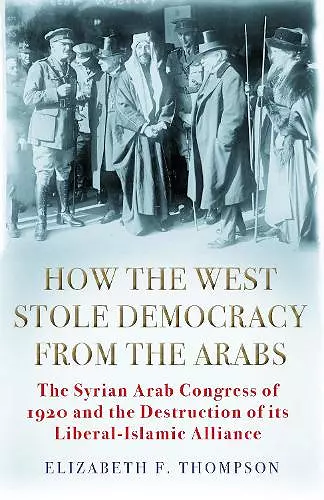How the West Stole Democracy from the Arabs
The Syrian Congress of 1920 and the Destruction of its Liberal-Islamic Alliance
Format:Hardback
Publisher:Grove Press / Atlantic Monthly Press
Published:7th May '20
£25.00
Available to order, but very limited on stock - if we have issues obtaining a copy, we will let you know.

When Europe's Great War engulfed the Ottoman Empire, Arab nationalists rose in revolt against their Turkish rulers and allied with the British on the promise of an independent Arab state. In October 1918, the Arabs' military leader, Prince Faisal, victoriously entered Damascus and proclaimed a constitutional government in an independent Greater Syria.
Faisal won American support for self-determination at the Paris Peace Conference, but other Entente powers plotted to protect their colonial interests. Under threat of European occupation, the Syrian-Arab Congress declared independence on March 8, 1920 and crowned Faisal king of a 'civil representative monarchy.' Sheikh Rashid Rida, the most prominent Islamic thinker of the day, became Congress president and supervised the drafting of a constitution that established the world's first Arab democracy and guaranteed equal rights for all citizens, including non-Muslims.
But France and Britain refused to recognize the Damascus government and instead imposed a system of mandates on the pretext that Arabs were not yet ready for self-government. In July 1920, the French invaded and crushed the Syrian state. The fragile coalition of secular modernizers and Islamic reformers that had established democracy was destroyed, with profound consequences that reverberate still.
Using previously untapped primary sources, including contemporary newspaper accounts, reports of the Syrian-Arab Congress, and letters and diaries from participants, How the West Stole Democracy from the Arabs is a groundbreaking account of an extraordinary, brief moment of unity and hope - and of its destruction.
Elizabeth F. Thompson has brilliantly recreated this fateful turning point in twentieth century Middle Eastern history. I thought I knew this story well. But the new details she reveals in this riveting account often left me open-mouthed. * James Barr, author of A LINE IN THE SAND *
A bold and important book. Through brilliant scholarship and engaging prose, Thompson pieces together the Arab constitutional order that European imperialism shattered in the aftermath of World War I. Essential reading for anyone who wants to understand a century of conflict in the modern Middle East. * Eugene Rogan, author of THE FALL OF THE OTTOMANS *
Harnessing meticulous research to careful analysis; moving among international diplomacy, personal interactions, and local politics, Thompson expertly argues that after World War I, the fate of Ottoman Arab lands was not merely contested but that radically different outcomes for independence, constitutional government, and liberal arrangements were very live possibilities, far more so than is generally remembered. * Nathan J. Brown, Professor of Political Science and International Affairs at George Washington University *
Elizabeth Thompson, in a sweeping and magisterial argument, demonstrates that the perpetual hand-wringing in London, Paris and Washington over the lack of democracy in the Arab World is sort of like Jack the Ripper complaining about the high murder rate. Breath-taking in its moral clarity. * Juan Cole, Richard P. Mitchell Collegiate Professor of History, University of Michigan *
An outstanding book on the attempts by Western actors to not only reverse democracy in Syria in the early 20th century, but also to deliberately conceal the reality of this reversal. Through rich archival research, Thompson puts forward an important and fascinating corrective to conventional and longstanding accounts. -- Amaney A. Jamal, Edwards S. Sanford Professor of Politics, Princeton University
Elizabeth Thompson has successfully combined her mastery of the immensely complex relationship between the Middle East and the West during World War I with her capacity for excellent storytelling...an essential read. -- Leila Fawaz, author of A LAND OF ACHING HEARTS
This eye-popping work of history reveals the extent to which Europe is complicit in the failure of democracy in many parts of the Middle East... A necessary work of history in an era when the region, as ever, is treated as having "ancient hatreds" at the root of its problems. The appearance of Thompson's book gives yet another important corrective to this historical myopia. -- John Freeman * Lit Hub’s Most Anticipated Books of 2020 *
[A] recounting of the short-lived Syrian Arab Kingdom (comprised of the modern states of Israel, Jordan, Lebanon, Palestine, and Syria) and its betrayal by Western powers... succeeds in making the case that the West's betrayal of Syria set the stage for a century of regional strife. This expertly researched account brings to life a meaningful but underexplored chapter in world history. * Publishers Weekly *
An impassioned argument that the Arabs of Greater Syria who fought for the Allies in World War I, deeply committed to the Wilsonian notion of self-determination, were robbed of their chance at democracy... Thompson fashions an original, authoritative study, laying out the process of the "theft" of Syrian democracy. * Kirkus Reviews *
ISBN: 9781611856392
Dimensions: 240mm x 170mm x 40mm
Weight: 930g
496 pages
Main